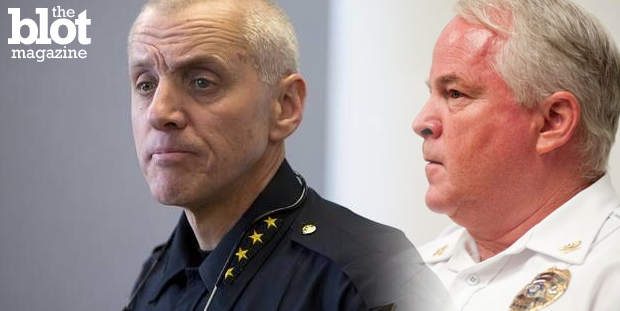Mere hours after one of his officers fatally shot an unarmed black man, the chief of police in Madison, Wis., sought to strike a conciliatory tone with the family of the victim and an incensed community who renewed calls for an end to violent police-citizen encounters.
Mike Koval not only met with the family of 19-year-old Tony Terrell Robinson Jr., but prayed with them as well. At a press briefing, he released the name of the officer who pulled the trigger — Matt Kenny, a 12-year veteran with his agency — and disclosed that the victim had not been armed. And he acknowledged that there were similarities between the shooting in Madison with one that happened just a few states away that sparked violent protests and a push for law enforcement reform.
“To the extent that you have, again, a person of color, unarmed, who subsequently loses his life at the hands of the police, I can’t very well distance myself from that brutal reality,” Koval said.
But Koval is determined to prevent what happened in Ferguson from happening in Madison. To that, Madison’s police chief has taken a different approach over the past few days compared to that of Ferguson’s police chief Thomas Jackson last August.
When protests erupted across Ferguson last year following the shooting death of unarmed 18-year-old Michael Brown Jr., Jackson urged demonstrators to leave the streets and go home. When protests broke out in Madison immediately following the shooting, Koval said the reaction by citizens was “appropriate under the circumstances.”
Read more: DOJ Slams Ferguson Police in Scathing Report
In Ferguson, police donned riot gear and launched tear gas in an effort to disperse protesters and arrested citizens and journalists alike when they refused to leave the streets. In Madison, police have kept watch on protesters from a distance; the demonstrations have been civil, and no arrests have been made.
Shortly after the shooting in Ferguson, Jackson released a convenience-store surveillance tape connecting Brown to an alleged shoplifting incident just minutes before he was shot by police officer Darren Wilson (Jackson said the tape was released due to numerous records requests, something TheBlot Magazine debunked weeks later). In Madison, Koval refused to answer reporters when pressed about Robinson’s criminal history, saying the timing was not appropriate given the shooting that had taken place the night before (The Associated Press later reported on Robinson’s criminal history based on documents it had obtained).
In Ferguson, Jackson withheld Wilson’s name from reporters without any apparent legitimate reason and despite numerous requests from local, national and international reporters. In Madison, Koval disclosed Kenny’s name within hours of the shooting without prompt.
Jackson eventually apologized for Brown’s death in a scripted, edited and polished video released online (“I am truly sorry for the loss of your son,” he said). Koval apologized for the shooting the day after it happened in an off-the-cuff remark at a press briefing (“We have to say we are sorry at the outset for it and then we have to show affirmative steps in moving forward to bring community back into the fold,” he said).
The difference in how Ferguson’s law enforcement leadership handled an unfolding crisis over how Madison is choosing to handle its crisis has not gone unnoticed. And while some have suggested the Madison police department has taken a lesson from the mismanagement in Ferguson, others point to a strong police-citizen bond in the Wisconsin metro city.
“I think it’s very clear that Madison, Wisconsin, is not Ferguson, Missouri,” Jim Palmer, the executive director of the Wisconsin Professional Police Association, told CNN in an interview.
There will continue to be protests in Madison over the next few days, and perhaps weeks. A community will try to heal itself through calls for reform to a very broken police system in which blacks are routinely singled out, charged and convicted of crimes at a disproportionately higher rate than any other group.
But what you won’t see in Madison: Burning liquor stores, looted toy stores, tear gas and riot police. Unlike Ferguson’s Thomas Jackson, Madison’s Mike Koval knows the community has a fuse, and he has the match.
Matthew Keys is a contributing journalist for TheBlot Magazine.






